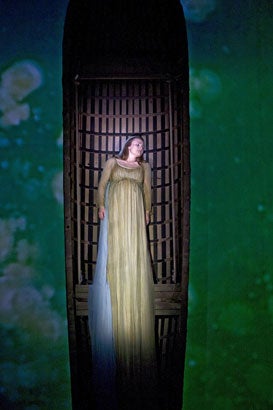Riders to the Sea, London Coliseum, London

It was always going to be an intense evening – but factor in the untimely death of its conductor, Richard Hickox, and it became a profoundly sad one. How typical that Hickox should have been the motivator for English National Opera’s first ever staging of Vaughan Williams’ exquisitely understated setting of J.M.Synge’s Riders to the Sea in the 50th anniversary year of the composer’s death.
But how inspirational of its director Fiona Shaw to set it up with a piece in so many ways its kindred spirit: Sibelius’ Luonnotar. Both are elemental hymns to the natural world and our subservience to it; both sing of creation, mortality, and re-birth.
A startling image of what might at first be construed as the tall shadow of a hooded form looking out to sea quickly emerges as an overhead perspective on an Ophelia-like figure suspended in the husk of a fishing boat, her long robes flowing into the water as oceanic projections (Dorothy Cross) gradually overwhelm her. Sung with fabulous bravery and aching beauty by Susan Gritton, it’s as if Sibelius’ keening melismas had bled into the music of Maurya, the tragic mother of Riders to the Sea.
And as the ghosts of her lost sons ceremoniously take Sibelius’ spirit of the air from the water, now impregnated with their souls, it is as if we really have found ourselves on the edge of the world, the edge of eternity. Designer Tom Pye’s craggy Aran coastline is at one with the sea, a rectangle of light marking out a mere tracing of Maurya’s home. She and her daughters (Kate Valentine and Claire Booth, both heartbreaking) and her one remaining son Bartley (Leigh Melrose) are thus so connected with the elements that their vulnerability and proximity to death is a constant throughout the fragile 40 minutes of Shaw’s poetic staging.
The physicality of its anguish is sometimes in direct contradiction of Vaughan Williams’ modal calmness but how wonderfully he frees the words so that in Patricia Bardon’s towering performance as Maurya the sung and the almost spoken are indivisible. One really feels this proud women’s heroic resistance, the sheer effort of staying strong and upright - so that when she does finally take her last son’s lifeless naked body in her arms the moment is overwhelming.
This is Vaughan Williams’ finest moment, too, a lamentation of extraordinary beauty which Bardon sings as if finally released from her grief and somehow reborn. Fishing boats descend from above like coffins for each of her dead men; Luonnotar reappears, pregnant with the next? Quietly devastating.
Subscribe to Independent Premium to bookmark this article
Want to bookmark your favourite articles and stories to read or reference later? Start your Independent Premium subscription today.

Join our commenting forum
Join thought-provoking conversations, follow other Independent readers and see their replies